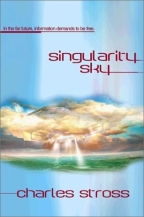Singularity Sky
Charles Stross
Ace / Penguin Putnam
US Hardcover First
ISBN 0-441-01072-5
Publication Date: 08-05-2003
313 Pages; $25.95
Date Reviewed: 09-17-03
Reviewed by: Rick Kleffel © 2003

REFERENCES
COLUMNS
|
|
|
Singularity SkyCharles StrossAce / Penguin PutnamUS Hardcover FirstISBN 0-441-01072-5Publication Date: 08-05-2003313 Pages; $25.95Date Reviewed: 09-17-03Reviewed by: Rick Kleffel © 2003 |
|
|
REFERENCES |
COLUMNS |
Readers who look to space opera for a sort of comfort reading, for a genre where authors familiar and new deliver a product that can be easily defined and predicted had best steer clear of 'Singularity Sky' by Charles Stross. This lucky-bag of a novel has more edges, more jutting sharp pointy things, more dangerous parts than a toolbox after it's been plundered by a ten-year old. Stross tosses ideas about with complete abandon. Sometimes he hits a target dead-on, while other times he takes out an innocent bystander or two. Occasionally readers will feel as if they are the innocent bystanders. Sheer exuberance and skillful editing turn this patchwork joy into an enjoyable reading experience for a pretty large portion of the audience. Stross seems to have found a Pandora's box of authentically mind-boggling ideas, many of which he can convey to the reader. Even if you don't understand precisely what Stross is talking about, it's hard not to get caught up in his enthusiasm.
When telephones fall on the city of Novy Petrograd, it heralds the start of a war. Novy Petrograd is a backwater's backwater. The reader is plunged into a world that is both very familiar, yet tinged with absurdities that are obviously grounded in an understanding of reality that is at first light years beyond the reader. Marxist wannabe revolutionaries squabble, while back on New Republic -- for Novy Petrograd is only a colony -- preparations are made to battle a revolution that none involved can possibly comprehend. This looks like a job for the UN, for all that's left of the earth we now know are the problem solvers of this still-functioning bureaucracy. But wait -- there's more.
That last sentence could easily be an effective alternate title to this novel. Stross ignores that old "one wonder" rule I remember hearing back at the dawn of my science fiction reading days. He doesn't just ignore it, he inverts it, piling on the strangeness at an exponential rate that rapidly seems to equal that of a singularity, the self-modifying "strongly superhuman" intelligence of the novel's real title. Along the way, we're introduced to two characters who form the kernel of this self-programming computer of a story, Martin and Rachel. He's an engineer with an agenda, sent along to ensure that the fleet of ships bought by New Republic performs to spec. She's a UN agent sent to observe and subvert. They fight crime!
Of course, crime has come to have a rather different definition in the world of 'Singularity Sky'. Stross wipes the slate clean and redefines time travel, space travel, space battles, artificial intelligences, God, love and hardcore socialist politics. Taken singularly, many of the set-pieces are brilliantly executed, and those who look to space opera for thrilling sequences of battle will actually in fact find them here. But these aren't simply souped-up dogfights or 'The Battle of Britain' in space. Stross is informed not by World War Two movies but by years of work in the IT field. His conceits concerning the inter-relation of time and space travel are fascinating and sit comfortably on the edge of comprehensibility.
But wait -- there's more. Stross jump-cuts from one set of mind boggling ideas to another like a DJ who's take perhaps a little bit too much waker-upper. From a heated space battle to a world transformed by self-replicating nanotechnology, Stross struts across the conceptual landscape of today's technological frontiers with a bit too much ease. It all becomes rather teeth-rattling, but only in the most enjoyable sense of rattling teeth. Stross puts more thought into a page than many an SF writer puts into a trilogy.
As a reading experience it veers between hilariously absurd, surprisingly accessible and even touchingly poignant. A sequence about a Duke who is unfortunately granted his wish by god-like technology stands out like a fragile china doll in a boxful of techno-legos. It has the simple beauty of a wonderfully imagined fairy tale. Stross is clearly capable of superior prose and he often uses it, when it's called for. At other times, it seems as if he couldn't type fast enough to keep up with his own fevered imagination. The result is a sort of short-hand that really works to cut corners round the wonders that Stross is striving to capture. He takes an almost Zeno-like approach, grabbing half-a-loaf, then another half, then another, leaving just enough left to the reader's imagination so that the combination of comprehension and incredulity yields up the much-loved "sense of wonder".
When a writer is having fun, lots of fun, the result is usually that the reader has lots of fun as well. Stross is having so damn much fun that the result is a more-than-occasional furrowed brow. But beneath those furrowed brows, many readers will be wearing an unstoppable smile. If, as the cover of the novel states, "In the far future, information demands to be free", in the present, in 'Singularity Sky', information is not just free, it's running rampant. It's having a riot. You might be hurt. You might have fun. But afterwards -- given the plastic nature of reality -- you will be different.